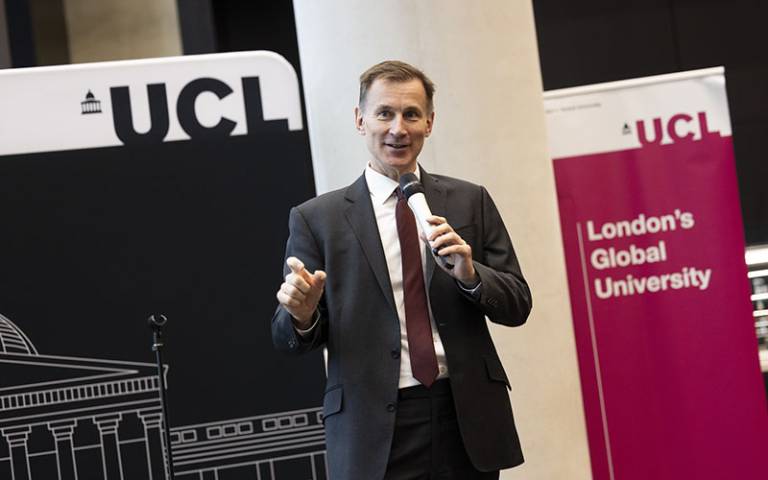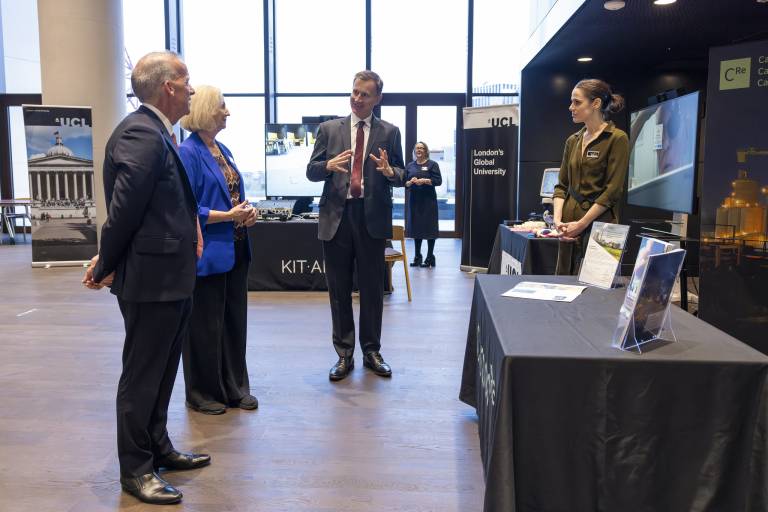Chancellor announces boost for university spinouts at UCL East
21 November 2023
Jeremy Hunt, the Chancellor of the Exchequer, was among a number of government ministers to visit UCL East today to mark the publication of the Independent Review of University Spinout Companies.

Also attending the event were university leaders, investors, spinout founders, and heads of technology transfer offices (TTOs), which are responsible for commercialising university research.
The review, whose recommendations the Chancellor accepted in full, provides best practice, “innovation-friendly” guidelines that aim to make the UK the best place in the world to start a spinout company. Ahead of the Autumn Statement on Wednesday, the Chancellor also announced £20 million for university-created businesses.
The Chancellor was joined at UCL East by Michelle Donelan, Secretary of State for Science, Innovation and Technology, and Andrew Griffith, Minister for Science, Innovation and Technology.
The Chancellor was given demonstrations of three successful UCL spinouts - Kit-AR, an augmented reality technology platform which improves production processes and quality control by guiding assembly workers in real time; Tenpoint Therapeutics, which uses pioneering cell engineering to tackle age-related or inherited sight loss; and CarbonRe, which uses AI technology to help heavy industry cut its emissions.
Ministers were welcomed by Dr Michael Spence, UCL President & Provost, Professor Paola Lettieri, Pro-Provost (UCL East), and Dr Anne Lane, CEO of UCL’s technology transfer office, UCL Business (UCLB).

Dr Spence said: “We were honoured to welcome the Chancellor and his colleagues to UCL East, our new campus on Queen Elizabeth Olympic Park, to share the findings of the Independent Review of University Spinout Companies.
“The review’s recommendations, which we warmly support, recognise the vital role universities play in driving innovation, improving society and transforming lives. We look forward to working closely with government, fellow universities and investors, to grow and accelerate the translation of cutting-edge research into the transformative businesses of the future.”
The independent spinout review takes its lead from the University Spinout Investment Terms Guide (USIT), published in April, which was developed in consultation with the TenU group of the UK’s leading university technology transfer offices, including UCLB and those from Imperial, Cambridge, Oxford, Manchester and Edinburgh.
Dr Lane, of UCLB, said: “For 30 years, UCLB has created successful spinout businesses from UCL’s ground-breaking research, which have raised £2.75bn investment in the last five years alone. As well as creating jobs and economic impact, these spinouts scale up solutions to complex societal challenges, from reducing carbon emissions to therapies for rare hereditary diseases.
“The recommendations published in this review will help universities harmonise the creation of spinouts. We look forward to working even closer with fellow universities, government, and the investment community to ensure a healthy and sustained flow of investment back into academic research whilst supporting the emerging world-changing businesses of the next 30 years.”
UCLB provides funding sources, IP support, and initiatives including end-to-end project management and mentorship to academics looking to turn their ideas into technologies with real world impact.
UCLB has 75 spinouts in its portfolio, including Autolus Therapeutics, which develops revolutionary CAR-T cancer therapies and, since launching in 2014, is now valued at over $753 million and employs 400 people in London and Stevenage.
Another spinout, Satalia, acquired by the global WPP group in 2021, uses AI to solve some of industry’s most complex optimisation challenges. For example, they have helped companies such as Tesco reduce fuel consumption by planning more efficient delivery routes.
The newly announced government measures include:
- At least £50m additional funding for the British Business Bank’s successful ‘Future Fund: Breakthrough’ programme – that will provide direct investment to support the UK’s promising pipeline of R&D firms.
- A Venture Capital Fellowship scheme to support the next generation of world-leading investors in our renowned VC funds, similar to the successful US Kauffman Fellowship.
- New vehicles tailored to the needs of pension funds to help them invest the capital unlocked through the Chancellor’s Mansion House reforms.
- This includes £250m to support successful bidders, subject to contract, under the Long-term Investment for Technology and Science (LIFTS) initiative, and a new Growth Fund within the British Business Bank to give pension funds access to investment opportunities in the UK’s most promising businesses, which has been welcomed as a valuable addition to the market by seven pension funds.
- Publish analysis showing the advantages that very large pension schemes can bring for investment in things like private equity – and outlining next steps on the Government’s pro-consolidation Value for Money pensions programme.
The Chancellor, Jeremy Hunt, said: “It’s critical that we give universities the tools they need to translate cutting edge research into exciting UK businesses that start and grow in the UK.”
Links
- Government announcement
- UCLB response
- UCL’s President & Provost
- UCL East
- Autolus Therapeutics
- Satalia
- Kit-AR
- CarbonRe
- Tenpoint Therapeutics
Images
- Top: Jeremy Hunt. Middle: Dr Michael Spence, UCL's President & Provost, Dr Anne Lane, UCLB CEO, the Chancellor, and Buffy Price, co-founder of Carbon Re. Gallery, from left to right: the Chancellor shakes hands with KIT-AR's founder and CEO Manuel Oliveira; the Chancellor and Michelle Donelan, Secretary of State for Science, Innovation and Technology; the Chancellor and Buffy Price; Dr Anne Lane, the Chancellor and Professor Pete Coffey (UCL Institute of Ophthalmology), of Tenpoint Therapeutics. Credit: HM Treasury / Kirsty O'Connor.
Media contact
Mark Greaves
m.greaves [at] ucl.ac.uk
 Close
Close





